Table of Contents
ToggleIntroduction to Travel Nursing Wages

Have you ever considered combining your passion for nursing and travel? Welcome to the exciting world of travel nursing – a profession that not only gives you the opportunity to help others, but also to explore the country, and yes, earn a handsome wage while you’re at it. Let’s dive into understanding travel nursing wages and the different factors that can influence them, setting the stage for a deep dive into every aspect of the compensation you can expect as a travel nurse.
Travel nursing represents a unique role in the healthcare system, allowing professionals to work in a variety of settings, strengthening the industry while gaining diverse experiences. It’s crucial to grasp the basics of travel nursing wages as there are elements that determine earning potential, such as base pay and variations in pay. In fact, numerous elements impact travel nursing wages, such as location, experience, and specialty. With so much to unpack, settle in as we take a closer look at what influences travel nursing wages, and how to navigate this lucrative field.
What is Travel Nursing?
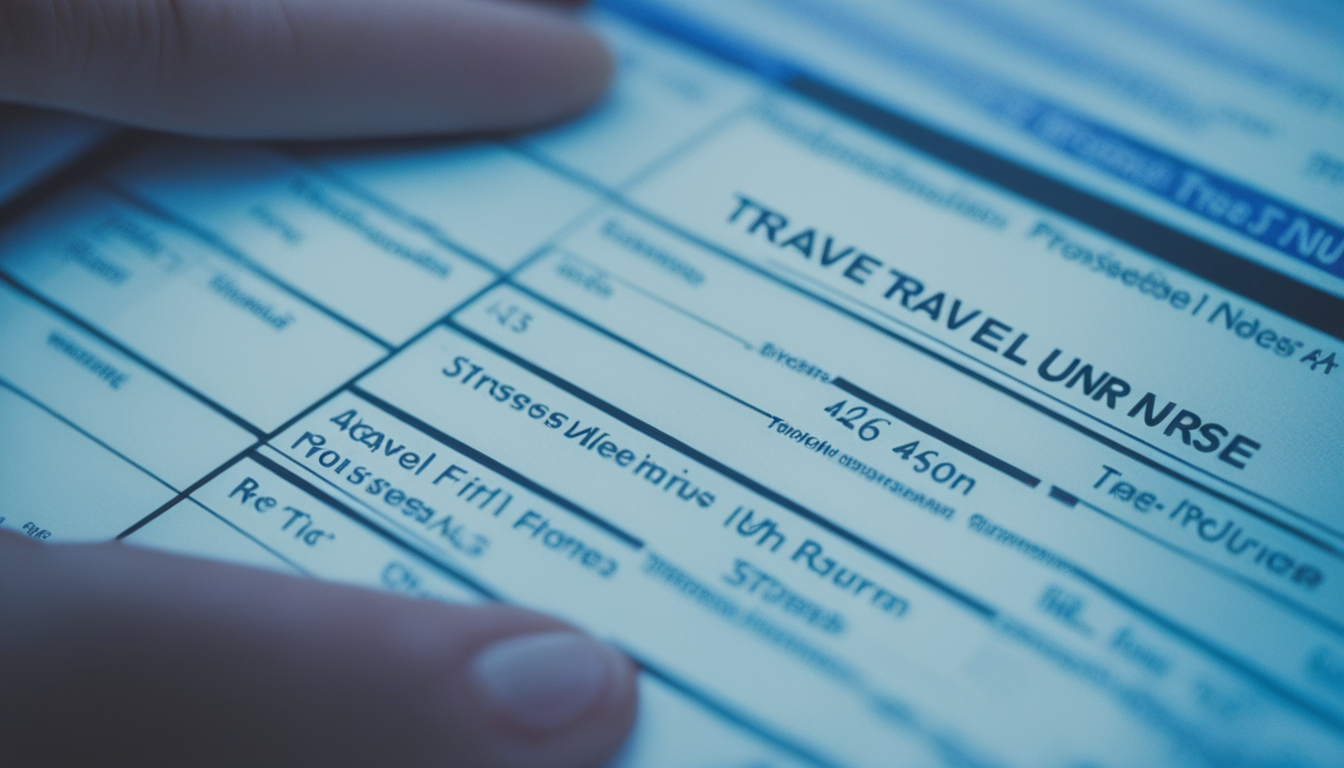
Travel nursing is a unique sector within the healthcare profession, offering both challenges and rewards. A travel nurse can be defined as a nursing professional who accepts short-term assignments across various healthcare settings, often travelling from one location to another location that has a higher need for nurses. The variety of settings in which they work can range from renowned metropolitan hospitals to rural clinics. This flexibility allows them to gain a breadth of experience and exposure to diverse patient populations and medical cases that typically wouldn’t be available in a more traditional nursing role. Travel nurses provide an essential service by filling in where there are shortages, often during times of crisis or seasonal fluctuations, therefore playing a critical role in the healthcare system. Their dynamic position allows them to learn and adapt quickly, making them valuable assets to any healthcare team. The role offers a unique opportunity for nurses to learn, grow, and explore different parts of the country while contributing to patient care.
Understanding the Basics of Travel Nursing Wages
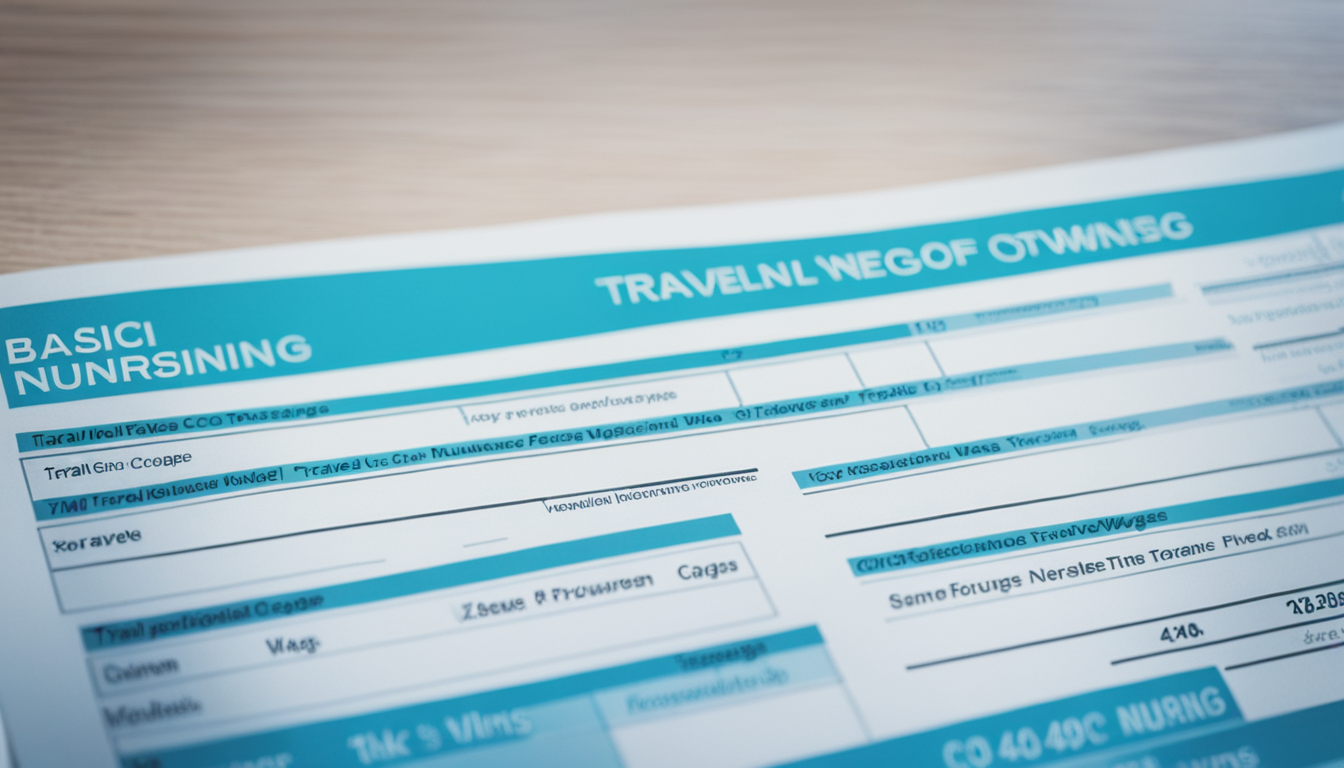
Travel nursing wages are often subject to many factors, but quite prominently, they revolve around base pay, potential earnings, and varying pay rates. The base pay is a fixed amount that travel nurses receive irrespective of the location or the difficulty of their assignment. It constitutes the bulk of their earnings and is usually paid on an hourly basis. Potential earnings, on the other hand, are the additional monies nurses can earn based on overtime work, bonuses, or specialized assignments, providing a means to significantly increase their income.
Pay variation is another important aspect of travel nursing wages. This basically means that the wages for travel nurses can change based on various considerations. For instance, a travel nurse working in a high-demand area like a major city might earn more than one stationed in a remote, rural area. Similarly, assignments that require specialized skills or services may offer higher pay. Therefore, it is crucial for aspiring travel nurses to understand these basic elements of wages in their profession. This allows them to make informed choices regarding their career paths, and adequately set their expectations.
Factors Influencing Travel Nursing Wages

A combination of factors weighs in on determining a travel nurse’s compensation. Their geographical location plays a significant part; nurses in urban areas or states with high living costs typically receive higher wages. Additionally, their focus area or specialty can also influence their income. For instance, specialties in high demand like critical care or neonatal nursing tend to have competitive salaries due to their crucial nature and relative scarcity.
Moreover, the level of experience a nurse has accumulated is another crucial aspect. A nurse with several years of experience in their field is likely to earn more than a relatively new one. It’s essential to note that specific skills and qualifications relevant to this profession can have an influential impact on wage scales as well. Finally, one’s credentials, such as additional licenses or certifications, could also affect potential earnings. It’s these factors combined that lead to a broad range of salary possibilities in the rapidly evolving world of travel nursing.
Geographical Impact on Travel Nursing Wages

The impact of geography on travel nursing wages is substantial, with urban areas typically offering higher wages than rural locations. This is largely due to the higher cost of living in cities, the increased demand for healthcare services, and the greater complexity of cases that nurses often encounter in these settings. For example, a travel nurse working in New York City may earn up to 20% more than her counterpart working in a rural town in Iowa, according to recent industry reports.
Variations are also significant between different states. This discrepancy often correlates with state-based healthcare challenges and the general living standards. In California, for example, where specific health issues such as a higher prevalence of chronic diseases are evident, travel nurse wages tend to be higher than in Mississippi, where such challenges are less pronounced. A California-based travel nurse may earn an estimated 25% more than a similar professional in Mississippi.
Despite these disparities, it’s worth pointing out that travel nurses often have the advantage of choosing where they work. This flexibility gives them a degree of control over their earning potential depending on the locations they favor. So, while the geographical aspect will always influence their pay, savvy travel nurses can strategically leverage this factor to maximize their earnings, such as by opting for assignments in higher-paying urban areas or states confronting significant health challenges.
Role of Experience in Travel Nursing Wages

The role of experience in determining travel nursing wages is pivotal. An increase in remuneration often goes hand-in-hand with years of experience. For instance, a travel nurse with multiple years of experience can expect to earn about 20% more than a less experienced counterpart. This can be attributed to their ability to handle complex patient cases and take on higher-level responsibilities within a healthcare setting.
Moreover, specific skills and qualifications also factor into wage determination. For instance, nurses specializing in fields such as ICU or Neonatal care tend to earn more due to the high demand and critical nature of these roles. These are positions that require sophisticated skill sets and extensive training, which justifies the higher pay.
However, it is important to note that experience alone can’t substitute for formal education and professional credentials. Having a bachelor’s or Masters degree in nursing, or certifications in specific nursing specialties can significantly enhance earning potential beyond just years of experience on the job. Thus, pursuing ongoing education and specialized training is often a rewarding investment for a travel nurse.
Specialization and its Impact on Travel Nursing Wages

The demand for specialties in the nursing field often results in competitive wages. High-demand specialties such as neonatal, intensive care, and operating room nursing usually earn more due to their complex nature. An example is the median wage of a neonatal nurse in the US, which may significantly exceed that of a general registered nurse, due as much to the extra training and skills necessary as the emotional demands of the job.
Specialized nursing roles typically require advanced skills and more extensive experience, which makes them desirable to many healthcare facilities. When a travel nurse has a highly sought-after specialty under their belt, they have a better bargaining chip to negotiate wages. For example, a travel nurse specializing in cardiovascular care can demand a higher salary due to the shortage of such specialists.
Do note that the level of pay varies widely among different specialties, often reflective of their relative supply and demand. While competitive salaries are a significant draw towards certain specialist areas, one should also consider personal satisfaction and interest within a particular field when choosing their career trajectory. Comparing median wages, work environment, job outlook, and job satisfaction can provide a clearer picture of what to expect from each nursing specialty.
Comparing Hospital and Travel Nursing Wages
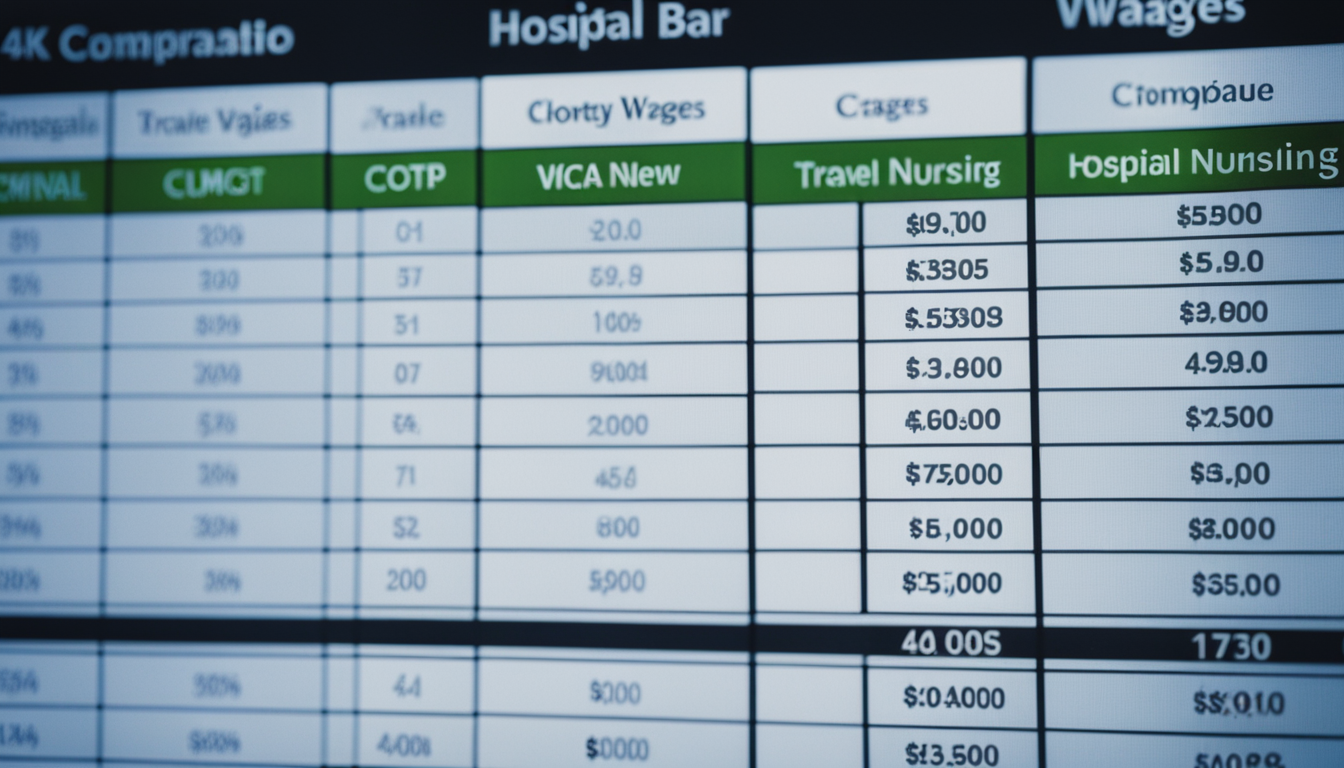
A comparison between standard hospital nursing and travel nursing wages reveals a significant disparity. Generally, travel nursing salary rates showcase an edge over their counterparts in traditional hospital settings. The lure of earning a higher income is one attraction many potential travel nurses consider, especially when faced with stagnating salaries in traditional hospitals.
However, it’s not just the base pay that swings the pendulum in favor of travel nursing. The profession also offers an array of benefits that supplement earnings. These include housing stipends, travel reimbursements, and more. This comprehensive package, although varying among agencies, boosts the overall earnings of a travel nurse drastically.
Yet, there’s a caveat. The handsome pay and benefits encapsulate the unique challenges of the profession. Travel nurses shoulder significant responsibilities, often in unfamiliar environments, requiring a level of flexibility and adaptability. The weight of these challenges somehow balances out the tantalizing wages.
Ultimately, this compensation comparison offers a lens for nurses to appraise both options. Despite its challenges, the lucrative pay rates and additional benefits do make travel nursing an appealing career for many. Considering the stagnant salaries in the hospital milieu, it is indeed worth exploring for those willing to embrace change.
Understanding Tax-free Stipends in Travel Nursing

Diving into the realm of tax-free stipends in travel nursing, they feature prominently as an attractive component to the overall remuneration. These stipends are mostly designed to cover living costs and are a significant player in boosting the financial package of travel nurses. They’re particularly beneficial due to their tax-free nature, thus allowing nurses to keep more of their earnings.
Tax-free stipends can cover a range of expenses incurred by travel nurses. Expenses like housing, meals, and incidentals form the common categories used as bases for stipend payments. When considering such stipends, it’s essential for nurses to keep an accurate record of their expenses to ensure their tax-free allowance doesn’t exceed the federally-established maximums for their work area.
However attractive the stipends may be, it’s crucial to understand that the Internal Revenue Service’s (IRS) regulations shouldn’t be ignored. Each nursing professional needs to have a tax home and satisfy the IRS’s stipulations to qualify for the tax-free stipend. Hence, understanding these rules will help nurses avoid potential IRS scrutiny.
In conclusion, tax-free stipends play a significant balancing role in the landscape of travel nursing wages. By comprehending the rules that govern them, travel nurses can substantially leverage their earning potential. This not only attracts nurses to the travel nursing profession but also provides them with a cost-effective and financially rewarding career path in the healthcare sector.
Benefit Packages for Travel Nurses

Health insurance, comfortable housing, retirement packages, and travel reimbursement collectively form an enticing component of the travel nursing package that goes beyond just the paycheck. Insurances, ranging from health to professional liability insurance, act like safety nets, ensuring the travel nurse’s financial stability. While compensation is vital, having a comprehensive insurance package underscores the commitment of healthcare institutions to the well-being of their travel nurses.
Supreme importance is attached to housing provisions. Travel nurses are provided either housing stipend or free housing arrangements. They can pick a comfortable apartment in desirable locations close to the medical facility. This not only eliminates unnecessary commuting stress but also ensures a satisfactory living experience.
Retirement benefits also play a crucial role in the overall compensation structure. Organizations often make 401k match contributions, thereby supporting their travel nurses in creating a robust retirement savings plan. It is an alluring perk that encourages longevity in the profession.
Additionally, the cherry on top is the travel reimbursement feature. Expenses related to travel like flights, car rentals, and other moving expenses incurred during assignments, are typically covered. It’s a true embodiment of the phrase, ‘all expenses paid.’ Thus, a rich benefit package comprehensively encompasses the all-round needs of travel nurses, making it a career worth considering.
How Travel Nurses can Maximize their Earnings

Getting licensed in multiple states greatly expands job opportunities, allowing travel nurses to tap into higher paying markets. Utilize various nursing boards and agencies to secure these licenses efficiently. Networking, both online and offline, can lead to job prospects that aren’t publicly listed. Collaborating with other nurses in forums or at conferences may reveal insider tips on the best-paying jobs. Negotiation skills are another crucial factor. Demonstrating the worth of your experience and specialization can earn you a higher wage. Ultimately, continuous learning, networking, and negotiation are the keys to maximizing earnings as a travel nurse.
Bonus and Overtime Pay in Travel Nursing

One important aspect of travel nursing compensation is the additional income accrued through overtime and bonuses. Overtime work is often readily available in this profession, providing a significant increase in income for those willing to work beyond standard hours. For instance, during busy seasons like flu season or a pandemic, overtime opportunities surge.
In addition, most staffing agencies offer completion bonuses after fulfilling contract obligations. For instance, after a 13-week assignment, a nurse could receive a bonus ranging from a few hundred to even several thousand dollars. These bonuses make a neat addition to the base pay.
However, it’s key to never rely solely on bonuses or overtime. While these financial perks are attractive, they’re not always guaranteed. For example, a contract might initially include a bonus, but it can be revoked if the nurse doesn’t work the stipulated hours.
Furthermore, excessive overtime could lead to burnout, impacting your work efficiency and overall health. Hence, balance is key: taking advantage of overtime and bonuses when available, but also knowing your limits.
Overall, while travel nursing offers competitive wages, the smart use of overtime and bonus opportunities can significantly augment a travel nurse’s earning potential.
The Impact of Short-term Assignments on Wages

Short-term assignments have a unique influence on travel nursing wages. They can surprisingly result in higher compensation due to increased demand for flexibility. Short assignments pose frequent relocation, which may deter some nurses, spurring employers to hike wages and garner interest. However, this means constant adaptation is required, including new hospitals, procedures, and even city nuances, which not all nurses might favor. On the other hand, the advantage here lies in diversifying experience and skills. In essence, it’s not a mere financial decision, but also involves considering personal career goals and lifestyle preferences.
Negotiating Travel Nursing Wages

Negotiation plays a vital role in determining travel nursing wages. It’s essential for nurses to arm themselves with information about standard rates and manipulate these details to their advantage. For instance, understanding the skill-demand ratio within different specialties can support successful negotiations.
Effective negotiation strategies include maintaining professionalism, emphasizing your unique skills, showing flexibility in terms of location or hours, and being firm on your minimum acceptable wage. Learning from experienced nurses who successfully negotiate their wages can provide useful insights.
Finally, remember that good negotiation isn’t just about the immediate wage but also long-term earnings. Factor in elements such as overtime pay, bonuses, and raises in your discussions. This tactic will ensure that your earning potential is optimized for the duration of your travel nursing career.
Best Resources to Check for Travel Nursing Wages

There are various resources available to gather information about travel nursing wages like online portals, such as TravelNursing.org and NurseFly. Networking platforms, like LinkedIn and Facebook groups, can also provide invaluable insight from seasoned travel nurses. Additionally, checking articles, studies, and reports from industry-based publications, like the American Association of Nurse Practitioners or the American Journal of Nursing, can offer comprehensive data and up-to-date trends in travel nursing compensation.
Travel Nursing as a Part-Time vs Full-Time Job

Part-time and full-time positions in travel nursing each come with their own unique advantages and drawbacks, particularly in relation to compensation. For the part-timer, there’s the flexibility of choosing assignments crafted around their availability. Additionally, they could supplement their income through other endeavors. Full-timers, on the other hand, get more consistent paychecks and might avail of various comprehensive benefits, depending on the contract.
Yet, the impact on wages between part-time and full-time work isn’t as straightforward as it may appear. Nurses working part-time might command a higher hourly rate, but their overall income might be less than full-timers due to fewer working hours. Conversely, full-time travel nurses might earn less per hour but more overall. The best choice relies on the nurse’s personal preferences and lifestyle needs.
Understanding Wage Differences: Local Vs International Travel Nursing

Differences in wages between local and international travel nurses are notable. Domestically, you’ll find variations depending on location, licensure requirements, and in-demand specializations. For example, a travel nurse in a populous city like New York could earn a higher wage than a rural area due to higher living costs and a higher demand for healthcare professionals. Internationally, the situation changes. A travel nurse in a country like the UK or Australia might earn less due to the stronger healthcare infrastructure and labor laws, but benefits such as comprehensive healthcare and paid leave could make up for this disparity. Thus, when considering a career in travel nursing, it’s crucial to look beyond just the base pay and take into account the comprehensive remuneration package.
Knowing When to Seek Professional Advice

There are moments in a travel nurse’s career where professional help may be invaluable, particularly when dealing with legal aspects surrounding contracts or deciphering complex tax ramifications. Leveraging expert advice can help clarify or avoid potential setbacks. For example, a lawyer could highlight contractual clauses that may limit earning potentials or point out tax obligations you could overlook. Hence, knowing when to engage professionals is crucial for a travel nurse to navigate these contractual and fiscal obstacles efficiently.
FAQs About Travel Nursing Wages
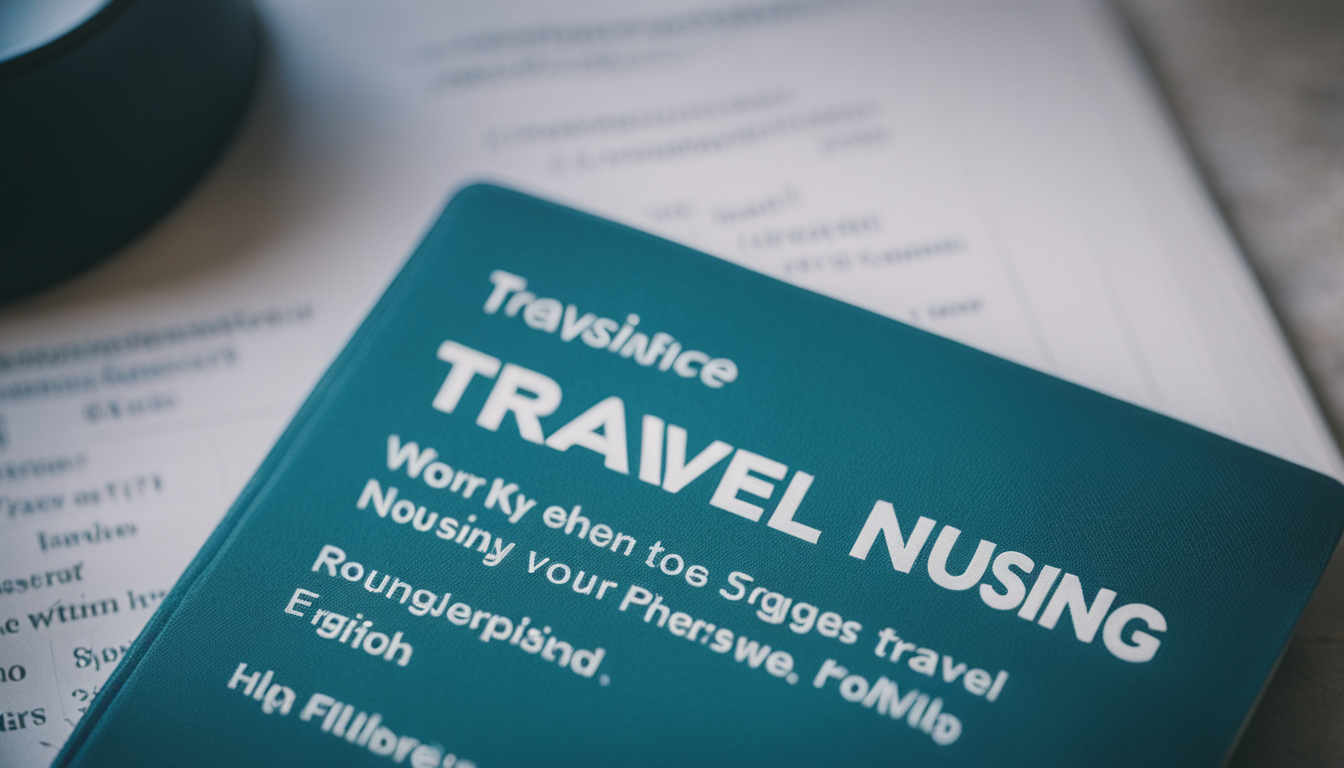
Addressing common questions, travel nursing wages can be influenced by a variety of factors including geographical location, experience and specialization. For instance, urban areas often offer higher pay due to costs of living. A nurse with more years of experience or in-demand skills can see a significant pay increase. Furthermore, some hospitals may offer differential rates or tax-free stipends boosting overall earnings. Gaining licensure in multiple states or proactively negotiating contracts can also impact a travel nurse’s income.
Conclusion: Key Takeaways about Travel Nursing Wages
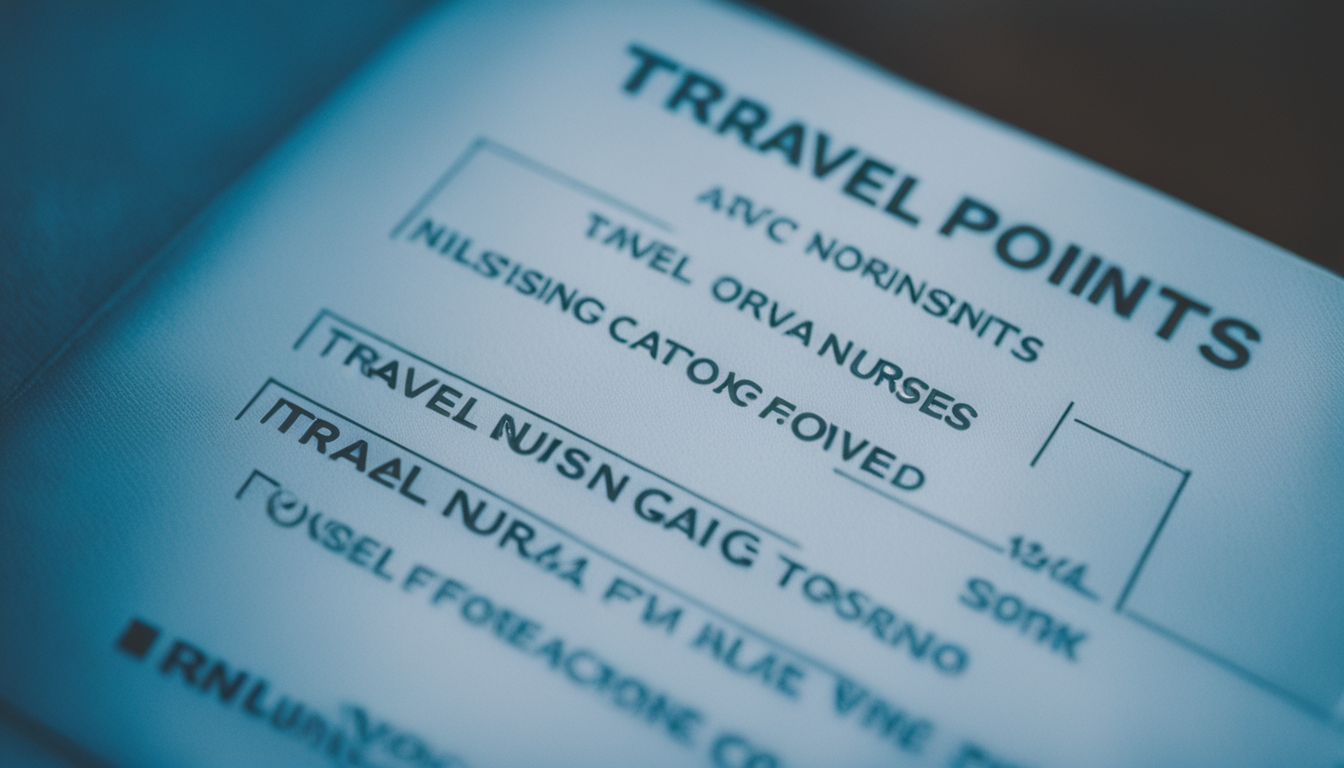
Taking into account all the points discussed, travel nursing wages are influenced by several factors such as location, experience, specialization and base pay. Understanding these aspects and exploring resources, negotiating effectively, acquiring additional skills or licenses, and considering various work settings can enhance earnings. Lastly, travel nursing is not just about the wages, but also the unique opportunities and benefits it offers. Applying this knowledge empowers you to optimize your travel nursing career. Explore this rewarding profession with confidence and leverage your skills to the fullest.
Sources:
- https://www.bls.gov/
- https://www.travelnursing.org/
- https://www.nurse.com/
- https://www.nursingworld.org/
- https://www.healthcaretravelers.com/
- https://nurse.org/

